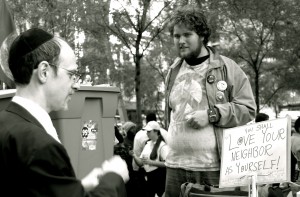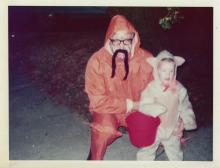Jesus
Social justice is redundant.
Justice, properly understood in a biblical sense, always has social implications.
Personal salvation is redundant in the same way. Salvation, properly understood in a biblical sense, while it may have broader implications, is always personal in nature.
Why the modifiers?

Here’s the story I tell about how I met my husband, Matthew.
I had left the conservative, sectarian church of my childhood along with their teaching that being Christian mostly meant buying an insurance policy for the hereafter. We were told not to concern ourselves with this world. We need not bother ourselves with the poor, the hungry, the stranger unless of course in doing so we might sell them the eternal insurance policy thus adding a notch to our holiness belt. See, as our hymns suggested, we were the spiritual 1 percent we were all about gold streets and mansions in heaven so the deteriorating sub-standard housing around the corner was not our concern.
Almost 10 years after leaving that form of Christianity and after involving myself quite deeply into issues of social justice I met Matthew, a really cute Lutheran seminary student. On our first date we sat across the booth from each other at el taco de Mexico and talked about social issues and we saw eye to eye on everything. Then he said, “my heart for the poor is rooted in my Christian faith” at which point I looked at him and thought: What are you? Like a unicorn? Some mythical combination of creatures that doesn’t exist in reality? Soon I learned there was a whole world of Christians out there who actually take Matthew 25 seriously. Who believe that when we feed the hungry, cloth the naked, and care for the sick we do so to Jesus’ own self.

It's that time of the year again, the joyful season when Jeff, my iTunes DJ, starts spinning holiday music when I choose "random" from the play options on my keyboard.
I almost always have headphones on with music playing as I work each day, and the surprise of what Jeff, as I call him, comes up with — especially when he reaches into the way-back machine for sonic fodder — is a daily delight.
First thing this morning, Jeff decided to play the tune "Miracle" by Ashville, N.C., singer-songwriter David Wilcox.
Oh joy! It's long been one of my favorite unconventional Christmas songs but I'd forgotten about its many charms until I was taking my first sip of coffee today.
The song, which appears on David's 2006 album Vista, is a take on the Natvity story seen through David's remarkably creative, often childlike sensibilities. Here's a taste of the lyrics:
Few will chose to follow
Out of all the star invites
Most will hide safe inside
With the lantern turned up bright
Waiting for a miracle
Today is Black Friday, the unofficial holiday immediately following Thanksgiving. Today, businesses open very early, offering reduced prices on all manner of consumer items. Customers are encouraged to flood the aisles in search of a good deal on all kinds of things - from DVDs to appliances - but, above all, electronics.
I have heard it said that people of Christian faith should be more about Easter and less about Christmas. Easter is a powerful hope but it deals with things beyond this life. It is a sure and certain hope but one that eludes my imagination, confounds my concrete mind.
The crucifixion is something I can wrap my mind around. We have only to open our eyes and our hearts to the realities of the world and we recognize the darkness of Good Friday. When the season is upon us I will dwell with great gratitude at the foot of the cross.
But, Lord God, I want to stay for a while in Christmas where hope is something I can cradle to my chest. I want to dwell here where music sings the promise of love, reminding me of those Mary moments in my life when it seems truth and love are about to burst forth from within and change the world.
Let me hearken to Mary’s song and hear it as a radical claim awakening me for the sake of revolution, to grab hold of the Kingdom of God already present amongst us.
I’ve learned that it’s especially important for those who are always trying to change the world, to remember what they are thankful for in their world as it is!
First I am thankful to God for his or her patience with us. Thankful that despite how much we human beings (perhaps especially we religious believers), so often disappoint, embarrass, and even hurt God with the things we say and do — even in God’s name; that God still continues to love us, forgive us, and call us to act more like God’s children, who should live together like brothers and sisters.
I am thankful to Jesus, who seems to have survived all of us Christians who name his name. Thankful that he is still so popular all over the world, even when Christians are, well, are not so much. But I’m also thankful for when Christians or others actually do the things that Jesus said, love their neighbors and even their enemies, just as he taught us to do, and when we do treat “the least of these” in the same way that we would treat him. I’m always most thankfully surprised by the unexpected and simple acts of love, grace, kindness, welcome, and justice that make people want to believe in and follow Jesus again....
Bread for the World has many recommendations in the new report, but I’d like to highlight just one for now: “Farm policies should lean more towards the production of healthy foods.”
Why this one? Most farm subsidies go to (wait for it) the largest, wealthiest producers (shocking, right?). Billions of dollars are spent subsidizing corn, wheat, soybeans, cotton and rice. Small and medium-size producers (many of whom grow vegetables — the foods that are supposed to make up half our dinner plate) receive little, if any, support from the current U.S. farm policy.
Securing affordable, healthy foods for our country’s poorest will in turn help us address other issues such as malnutrition and obesity, immigration, health care, and employment.
It’s time to invite the Occupy Movement to church!
And Thanksgiving is the perfect occasion. Have some of the young protesters — the “99ers” as they’re becoming known — from this rapidly growing movement over for a big holiday dinner!
Our faith communities and organizations should swing their doors wide and greet the Occupiers with open arms, offering them a feast to say “thank you” for having the courage to raise the very religious and biblical issue of growing inequality in our society.

For years, I've liked to call the Rev. Jim Martin, author of the new book Between Heaven and Mirth: Why Joy, Humor and Laughter Are at the Heart of the Spiritual Life, "my favorite Jesuit."
I'm certainly not alone in my fondness for Martin and his wry spirituality.
Stephen Colbert is so enamored of the exceptionally clever cleric's wit and wisdom that he made Martin the official chaplain of the Colbert Nation. (Click HERE to see some of Father Jim's past appearances on "The Colbert Report.")
Martin, culture editor of America magazine and a prolific writer whose previous books include My Life With the Saints, A Jesuit Off-Broadway and last year's The Jesuit Guide to (Almost) Everything: A Spirituality for Real Life, has an uncommon gift for making faith — and even religion — both accessible, genuinely hip and if not fun, exactly, at least enjoyable.
Unlike the earlier turn-of-the-20th-century Pentecostal movement, which created a plethora of new denominations, the Charismatic Movement — with its emphasis on the felt-presence of the Holy Spirit, intimate worship, healings, and spiritual gifts as written about in the New Testament — united Lutherans and Catholics, East Orthodox and Episcopalians, promising in its early years to utterly remake ecumenical dialogues into a fully-felt move of the Spirit.
These heady early days inspired everyone from the Jesus Movement to Richard Rohr and many believed that a new fullness of Christian faith was being formed.
Then, as often happens as new movements grow and spread, things got messy. Denominational officials became suspicious; new denominations like the Vineyard were born, attracting new Christians such as Bob Dylan.
The Norton commercial says explicitly what most advertisements only imply.
You are the things you own.
Your identity is the stuff you have.
Your worth is what you own.

This is true of any bad news, really. When I feel sick. When I don’t get my way. When I’ve had a bad day. You name it. If it’s negative, then I look forward to sharing it. I don’t mean to; I just do.
I sense this is normal, but it doesn’t make it right.
"God helps those who help themselves," is, unfortunately for Mr. Carney, NOT in the Bible.Rather it's an oft-quoted aphorism that sounds like it should be in the Bible but isn't. A "phantom scripture," if you will.
People of faith -- including evangelical Christians -- will be voting both ways in the upcoming election. It is simply not true that they will be voting only on one or two issues.
And, if evangelicals focus on many of the issues central to their faith, rather than becoming partisan cheerleaders, they might be able to raise some critical issues in this election and to hold both sides more accountable, even in a campaign that both Richard and I suspect will be one of the ugliest in U.S. history.
At the end of the evening, Amy remarked that if the upcoming election debates were as civil and substantive as this evening was, we would all be very grateful.

Abuse at Afghan Prisons. How Catholic Conservatives could turn the GOP presidential race. OpEd: Jesus would not #OccupyWallStreet. OWS is "largely secular." Religious leaders see immigration as "God's Call." OpEd: Alabama new immigration law has unintended consequences. OpEd: Wall Street Worship. Could 2012 be the most ideological election in years? And much more.
 We're in this thing together or we're not in this thing at all.
We're in this thing together or we're not in this thing at all.
We should all be marching in the streets.
We are the 100 percent.
We are poor. We are well-to-do. We are those somewhere in the middle. We are aware of the struggles and unfairness of this world and for this reason we are sensitive to one another's needs. So, we love our neighbors as ourselves.
What was most telling about the disagreement between the two men was their discussion of Luke 4. Mohler argued the passage should be understood in light of how he interpreted the preaching and teaching of Paul and the other apostles. This means that when Jesus said that he came to bring good news to the poor that good news was personal salvation.
Wallis argued that yes, personal salvation is one part of that good news, but that the other part is the Kingdom of God breaking into the world and transforming societal relationships as well. When the Gospel is proclaimed, it is good news for a poor person's entire being, community and world -- not just his or her soul.
First, it was encouraging to hear Mohler spend a lot of time emphasizing that working for justice is essential to fulfillment of the Great Commission. Throughout the night he repeated his concern that a lot of Churches are REALLY bad at making disciples who actually do the things Jesus told us to do. As the president of one of the largest seminaries in the world, it will be interesting to see if he is able to train a generation of pastors who will do things differently. My concern is that he is missing the connection between his theology and the failure of Christians to actually do justice.

One of my most vivid childhood memories of Halloween 1977, the year my family moved to a new town in Connecticut right after the school year had begun. I don't recall what my costume was, but I do remember going door-to-door with my father, meeting new neighbors and collecting a heavy bag of candy, as the suburban warren of Cape Cods and manicured lawns morphed into an other-worldly fairyland.
I was 7 years old and the new kid on the block, so when the cover of darkness fell at sunset, I hadn't a clue where I was. As my father deftly navigated our way home in the crisp autumn night, it felt like he had performed a magic trick. When the morning came, I couldn't believe that our adventure the night before had been on these same streets. To my young imagination (and heart) it felt as if we had been walking through Narnia or Rivendell rather than a sleepy New England suburb.
A few years after that, my family stopped celebrating Halloween. We had become born-again Christians and our Southern Baptist church frowned on the practice. Halloween, I was taught, was an occult holiday (or maybe even Satanic!) and good Christians should have nothing to do with it.
Baby steppin': Economy grew 2.5 percent in the third quarter. Democrats first offer: $3 trillion for debt. Immigration is a faith issue. Harsh rhetoric to derail the GOP? The canon of St. Paul's Cathedral in London resigns over plans to evict Occupy London protesters. Elizabeth Warren and the #OccupyWallStreet election test.

When I applied for a job at CNN in the 90s, and told the interviewer that I had interned with an evangelical magazine called Christianity Today, his response was, "If it's Christian, it isn't journalism."
Over the years that expanded to, "If it's evangelical, it's Republican. Or Jerry Falwell. Pat Robertson. The Tea Party. Wrapped in a Patriotic Flag. White People. Derivative, cheesy music. Big Money. Big Hair." Fill in the rest of the blanks.
Are those labels a distortion of what it means to be an evangelical? Of course they are. Yet they are how evangelicals are perceived, rightly or wrongly (I personally think it's a mixture of both), in our society.